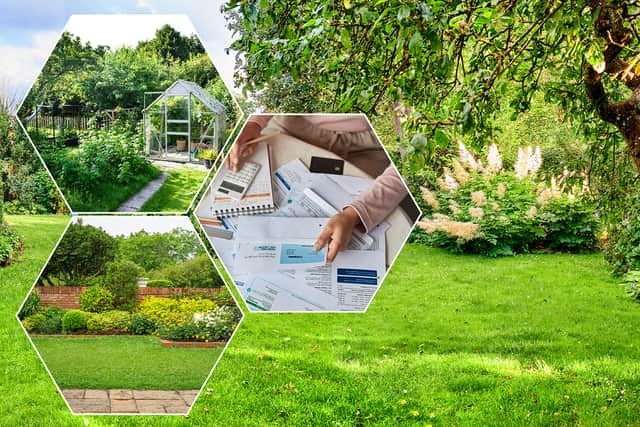Households who keep gardens green and full of plants should get council tax or water bill cuts, study suggests
and live on Freeview channel 276
Households who keep their gardens green and well-stocked with plants should be given a cut in their council tax or water bills, scientists have recommended.
Research from the University of Sheffield has suggested policymakers should offer financial incentives to encourage gardeners to use environmentally sensitive techniques to help combat climate breakdown and boost communities’ health and wellbeing.
Advertisement
Hide AdAdvertisement
Hide AdIt comes as the research shows cities may have lost as much as 50% of their green garden space over the past two decades as trends such as plastic grass have boomed in recent years, contributing to rising urban temperatures and biodiversity decline.
Professor Ross Cameron, an expert in landscape horticulture at the University of Sheffield and the author of the paper published in the journal Urban Forestry and Urban Greening, said “some trends in garden design” can be “very damaging for the urban environment”.
The study recommends that rewards for sustainable gardening could include reductions to council taxes, water bills or assistance with resources.


Cameron suggested offering these payments or discounts to house owners with more than 50% of their garden space planted.
Advertisement
Hide AdAdvertisement
Hide AdThe report also suggests that banning environmentally damaging materials such as pesticides, or practices such as installing astroturf, could also benefit the environment.
Traditionally private garden management has been up to the homeowner, but Cameron says a more radical approach is needed to tackle the climate emergency and biodiversity loss at a city level.
‘Gardens are ‘vital’ and ‘need to be green’’
Cameron said gardens are “vital spaces” and “need to be green and full of plants to be beneficial to the local environment.”
He said: “Gardens account for a third of all our urban areas and are vital spaces in terms of keeping our buildings and city environments cool in summer, absorbing rain to avoid flash flooding and providing an important refuge for wildlife. The paradox is that many gardens are not actually green and some trends in garden design can be very damaging for the urban environment.
Advertisement
Hide AdAdvertisement
Hide Ad“We have paved them over to house the car, or provide sterile patio space; factors that increase urban temperatures and increase flooding risk.”
He added: “Our research shows that some cities may have lost as much as 50% of their ‘green’ garden space over the last two decades.
“Many residents use artificial grass that kills much of the soil life underneath it, and when real plants are present, we wrongly assume we need to hit them with a cocktail of chemicals to keep them alive and free of pests. These chemicals pollute our watercourses and damage the ecological function of our gardens”.
Professor Helen Woolley, head of the department of landscape architecture and also at the University of Sheffield, said that many “quickly realised” how important their home gardens are “during the pandemic lockdowns.”
She said this academic paper “builds on and reinforces what we learned then” and “it is important that policymakers and planners take note.”
Comment Guidelines
National World encourages reader discussion on our stories. User feedback, insights and back-and-forth exchanges add a rich layer of context to reporting. Please review our Community Guidelines before commenting.
